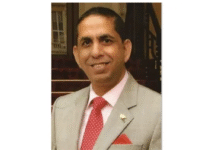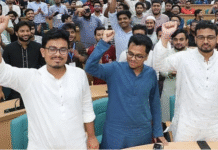‘Digital Security Act ‘dangerous’ for freedom of expression’
 Legal experts and civil society members on Saturday expressed fear that the Digital Security Act might be used to curtail the freedom of expression, reports UNB.
Legal experts and civil society members on Saturday expressed fear that the Digital Security Act might be used to curtail the freedom of expression, reports UNB.
Speaking at a discussion on ‘Digital Security Act-2018; Human Rights under Threat’ at Dhaka Reporters’ Unity (DRU), they urged the government to review it before approval by the president.
Committee for the Protection of Fundamental Rights, a platform of civil society members to protect fundamental rights, organised the discussion.
Supreme Court lawyer Shahdeen Malik apprehended that the legislature would curb citizens’ freedom of expression.
He noted that when a law proposes establishment of any special institution to implement the law, it clearly describes the duties, responsibilities and power of the institution.
However, this act does not have any clear description about the power of the institution and its chief rather, he observed.
It has the chance to be used wishfully by the government as they have kept the control to increase and decrease the work mandate of the institution and its chief and people are not aware of how the institution will practice the power, he added.
Malik said, “A specific law to address the misuse of computer system and internet is necessary for the country but not in the way which will curb the freedom of expression of the people.”
In 1791, the USA made their constitution having a provision to secure every right of freedom of expression of their people, but “I don’t know how many years will be needed for Bangladesh to reach USA’s 1791 standard of democracy”, he wondered.
Malik also alleged that several sections of the Digital Security Act are more alarming than the Section 57 of the Information Technology Act-2006 and he sought review of those.
Lawyer Jyotirmoy Barua said, “If anyone commits any offence under Section 32, meaning one breaks the Official Secrets Act, 1923 via a computer, digital device, computer network, digital network or any other digital media, s/he will get a maximum penalty of 14 years in jail or Tk 2.5 million in fines, or both. This goes counter to the objectives of Right to Information Act-2009.”
He also alleged that government is following the British conformist legacy to confine the basic rights of people.
Md Mahbubur Rahman of Department of Law of Dhaka University said the director general of the proposed digital security agency has been given the power to request the Bangladesh Telecommunication Regulatory Commission (BTRC) to remove any information or data or, in specific cases block the social media accounts if the DG is satisfied that the published content creating threat for digital security.
He said, “This section goes against the fundamental rights because it does not allow the ‘offender’ to know the offence he/she committed and the law does not have further procedure to ask the authority for rechecking the allegation brought against him/her.”
Comparing with the information technology related laws of India and Pakistan, he also said the range of punishment prescribed in the law is very harsh and which is, to him, ‘dangerous’ for freedom of expression.
Mentioning some of the terms- ‘Sprit of Liberation War’, ‘Religious sentiment’, ‘Image and reputation of the state’- as ‘vague and undefined’, Mahbub expressed his fear that these sections have the chance to be misused.
He also said the Bangladesh does not have any protocol or procedure to collect and store the digital evidence yet, but in the new act the police are given the power to search, collect or seize the digital evidence by accessing anyone’s computer.
Mahbub said many countries follow some protocols to collect and store digital evidences and Bangladesh should create one before implementation of the law otherwise, there remains a chance of evidence manipulation.









